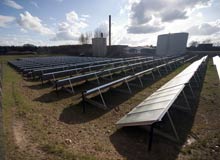At the COP21 in Paris early December where nearly 200 countries agreed to pursue a global warming temperature of ideally 1.5 degrees celcius, 4DH Deputy Head and Professor in Energy Planning Brian Vad Mathiesen was present with a part of the solution to the challenge.
At the COP21 side event “Technology solutions for a 2°C world”, Brian Vad Mathiesen presented the solutions from IDA’s Energy Vision 2050 made for The Danish Society of Engineers, IDA.
The IDA Energy Vision 2050 shows that a conversion to 100% renewable energy is a technical option within economic reach, that an integrated Smart Energy System design can create a more robust and resilient system, and that there is a potential for creating more jobs than in a fossil fuel based energy system as well as lower health related costs from emissions from the energy supply.
He also presented the results from the Heat Roadmap Europe studies, showing that Europe produces enough surplus heat, most of it currently going to waste, that could heat all the buildings via district heating. To obtain a higher percentage of district heating in Europe and make the buildings more energy efficient, investments of 1.1 trillion euro are needed, but this will pay off in the future, simultaneously reducing energy demand, imported fossil fuels, carbon dioxide emissions, and the cost of the heating, cooling, and electricity sectors.
TweetFUNDED BY
![]()







